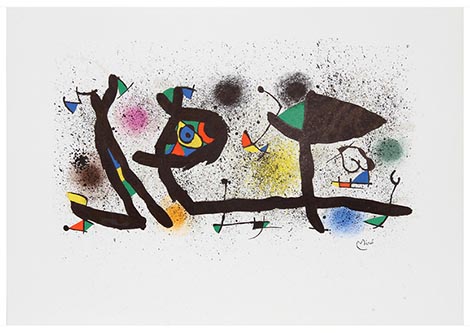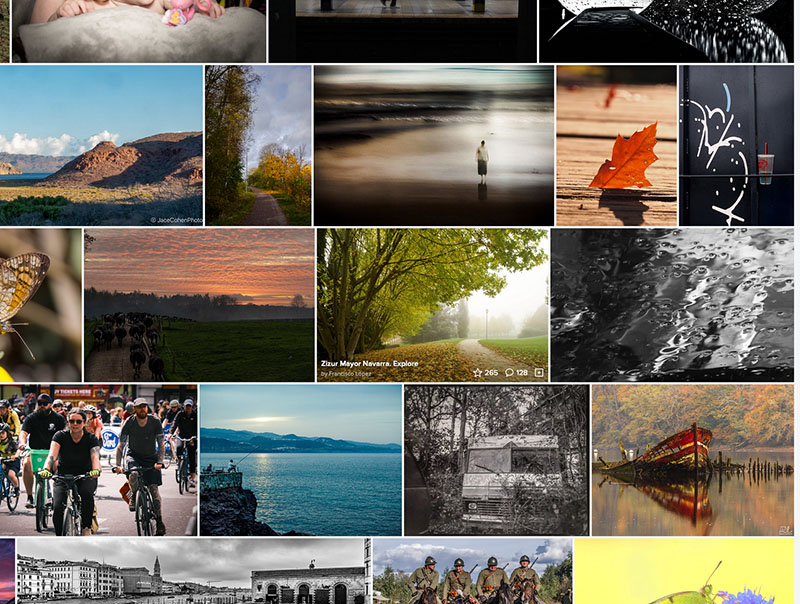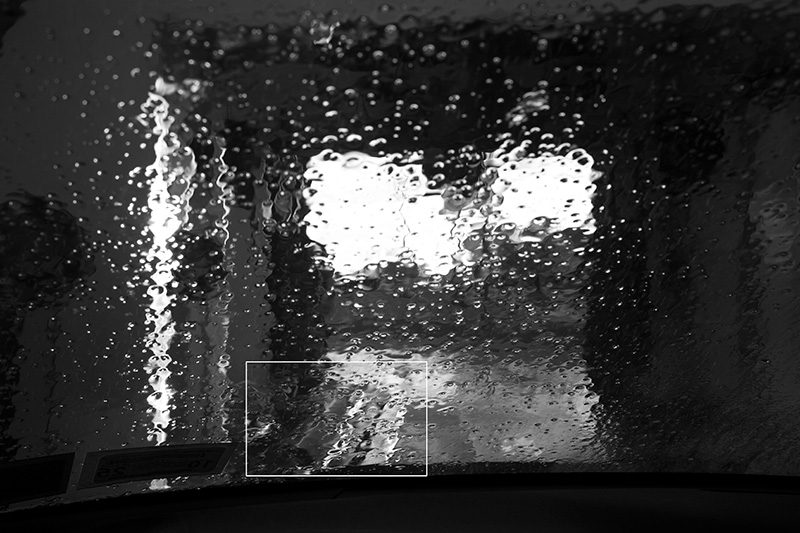The picture I showed you the other day, called "Car Wash," got picked for the "Explore" feature on Flickr. They're very good to me.
I'd post it again here but it's better if you go to the link and look at it full-sized. Or as full-sized as it gets. Study it for a minute. It actually isn't the greatest pick for Explore, because it doesn't attract the eye at a small size. You can't see the "eyes," which make it interesting.
Several people, there and here, have complimented me on the nice "abstract" shot. It's true that if you look at it carefully, the shapes seem to resemble a bunch of eyes; and, if they were eyes they would seem to have an alien, or inscrutable, "uncanny valley" kind of expression; and the brain struggles to pick out faces in the murk and confusion. An evolutionary psychologist, AKA sociobiologist, would say that's because we're descended from a long line of ancient ancestors who survived better because they were able to pick out hidden faces in a confusing visual field. If Ogg was waiting in the bushes to brain you with his club, or a sabre-toothed tiger were crouched in the grass intending to pounce, the earlier you could see them the better chance you would have of living to have offspring. That tug or interplay between "I know it's just droplets falling on a windshield" and "it looks like a bunch of eyes" is probably what makes the picture fascinating, if it is.
But the picture isn't abstract at all. David Vestal, one of my favorite writers on photography, used to love to start discussions with dictionary definitions. But a dictionary definition doesn't really help us here, because there are so many meanings of the word "abstract." Cambridge has a nice one, though: "existing as an idea, feeling, or quality, not as a material object." The opposite they propose is "concrete"...but you'd have to define that too, because they don't mean a building material made by combining cement, sand, small stones and water. Concrete, per Cambridge*: "clear and certain, or real and existing in a form that can be seen or felt." Some other dictionaries are not as helpful.
I'm not sure where that gets us, though, because "Car Wash" is a perfectly realistic photograph. In fact the title is intended to make what you're seeing snap into that reality—I'm inside the car going through a car wash, taking a picture of the windshield, with the lens's focus on the windshield; there's some out-of-focus blur at the top because the top of the picture is closer to me, not farther away. It's heavily cropped. Here's the whole frame:
Original image showing area of crop
...But other than that, as well as some slight motion blur on the falling droplets you can see on the left-hand side of the cropped version at Flickr, it's a perfectly realistic photograph of what it is, presented just as it came out of the camera, without alteration.
So what's "abstract" about it? Just the fact that it's a "detail" (the art-critical term) or extract of a larger work?
I almost don't believe "abstract photographs" are even a real thing. With two nagging caveats: first, I can find a few if I really try. An example: I hauled my single-digit-age son to an audio store (remember those?) once, and, bored as usual, he amused himself by playing with my early digital camera, sitting in a swivel chair and exposing pictures as he spun himself around. One of the pictures, highly blurred, darker on the bottom and lighter at the top, looked for all the world like some sort of uncanny dream landscape. I suppose that was an "abstract photograph." You could also say that highly manipulated or AI-enhanced photographs are pictures abstracted from, er, photographs. But a lot of photographs with the "abstract" category label just don't seem to fit the bill for me. You might say that the photographer zooms in on the shapes, colors, textures, or details so far that the objects, light, or atmosphere doesn't readily reveal what those things were, and that's okay I suppose, if that's your opinion. But if that's the case, aren't all (or almost all) photographs "abstracted" from their broader surroundings by the simple act of framing?
The second nagging caveat is that maybe I just don't get it. Shoving pride aside, it's wise to keep in mind that that's always possible.
 Joan Miro, Sculptures (M.950), 1974, lithograph
Joan Miro, Sculptures (M.950), 1974, lithograph
Now that's abstract.
Mike
*I'm coming to like the Cambridge Dictionary more and more.
Original contents copyright 2024 by Michael C. Johnston and/or the bylined author. All Rights Reserved. Links in this post may be to our affiliates; sales through affiliate links may benefit this site. As an Amazon Associate I earn from qualifying purchases. (To see all the comments, click on the "Comments" link below or on the title of this post.)
Featured Comments from:
Peter Conway: "The Wikipedia entry for Abstract art starts with the following Rudolph Arnheim quote, from his book Visual Thinking (1969): 'Abstract art uses visual language of shape, form, color and line to create a composition which may exist with a degree of independence from visual references in the world.' I think that's an excellent definition of abstraction, as it applies to art. It certainly allows for different levels of abstraction, and nothing in the definition would preclude photographs from being considered abstract—even yours!"
Hugh Crawford (partial comment): "There is literally no such thing as nonrepresentational art. Everything represents something, even art. There are even entire schools of art centered on that idea. Robert Rauschenberg’s 'Erased de Kooning Drawing' for example is literally an almost blank piece of paper, yet there are hundreds of thousands of words written about what it represents. There’s a running art world joke that I think I heard from John Baldessari, 'what does Jackson Pollock's "Blue Poles" represent? Oh, (long pause) about 23 million dollars.' Joke needs adjustment for inflation; I think 23 was just a funny number."
Richard G: "I like MikeK’s comment about black and white itself already being a degree of abstraction. I look for abstract compositions everywhere, certain patterns and resonances of geometry. I’ve done this for years and can remember the first photograph I took that started this. There was some ambiguity in the pattern of the shapes of the blocks of the stone plinth and shadows of a nearby monument, but it is neither ambiguity nor obscurity which is required. I see it more and more as I’ve developed this interest. A collection of rooftops, the pattern of passersby, a series of circles. I was stunned when I first looked through Ernst Haas’s New York in Color. He saw these abstractions everywhere. Was it him, or is it me? It was him. Have a look at the Abstract thread on rangefinderforum. Or photographs of Lucien Hervé, composing with the shapes of shadows.
"Following your evolutionary lead, I would say that there may have been survival advantage in recognizing patterns. If I find something, the hairs are up on the back of my neck and I am in an almost ecstatic zone. Now with digital I can take 20 shots of some inconsequential piece of street architecture. So often the first shot was the best. It’s like music. Mathematical. The geometry is like jazz, or Bach. But it may not be everyone’s thing. I was so surprised in reading Nabokov’s autobiography, a stunningly beautiful book, that despite his poetic prose and the brilliance of his ideas, he has no interest or love or even understanding of music."
ChrisC: "Isn’t abstract simply the opposite of the definition you gave for figurative a few days ago?"
Mike replies: That's an interesting thought.





To show the crop frame: after cropping, select “crop” again. This will show the full image with the crop outlined. Then take a screen shot of the image portion of LR. Mission accomplished
Posted by: Scott | Friday, 15 November 2024 at 12:16 PM
Well, yes, by your definition photography cannot be abstract because a photograph is always an imprint of concrete light bouncing off concrete matter.
I think what most people mean with the word abstract is that the photograph doesn't look like an easily recognizable thing.
How about this definition?
"Abstract art exists on a continuum, from somewhat realistic representational work, to work that is not based on anything visible from the real world. Even representational work is abstracted to some degree; entirely realistic art is elusive.
Work that does not depict anything from the real world (figures, landscapes, animals, etc.) is called nonrepresentational. Nonrepresentational art may simply depict shapes, colors, lines, etc., but may also express things that are not visible– emotions or feelings for example."
From Libre Texts
Posted by: Yoshi Carroll | Friday, 15 November 2024 at 12:37 PM
Pareidolia
Oh, and you are going to love the national institute of health’s take on this.
https://pmc.ncbi.nlm.nih.gov/articles/PMC9508550/
Apparently a marker for intelligence and creativity.
Posted by: hugh crawford | Friday, 15 November 2024 at 12:40 PM
I always think in 'degrees of abstraction'. Be it by framing, cropping or whatever, we move away from the figurative (to borrow from the recent post concerning painting) or literal representation toward something less obvious. I'd argue that even by using black and white, rather than colour, in a photo, one introduces a degree of abstraction.
Posted by: MikeK | Friday, 15 November 2024 at 12:45 PM
I think many people conflate "ambiguous" with "abstract" when it comes to photography. One subtle way in which "Car Wash" is ambiguous is that the material we're looking at is not definitive. It could be water, oil, some kind of plastic or metal...
But if abstract is in the eye of the beholder, there are plenty of abstract photographs. Not for me. The variety of ways photographs can render the normally invisible visible, or unexpected? That doesn't qualify in my mind.
It's easier with film and print, as one can manipulate the emulsion itself in any number of ways and create something genuinely abstract, as in "not an image of the material world". I guess the digital equivalent is manipulating the image file. You can create one from scratch, too, but then that isn't photography, is it? There was no "writing with light".
Some photographs manage to straddle the line, like Sugimoto's seascapes. (Hm. They almost literally straddle a line, don't they? Unintended pun! Or at least unconscious.) A photograph in which absolutely nothing is remotely in focus might also straddle that line.
I don't think there's any answer to this question, but it's a fun little experiment.
Posted by: robert e | Friday, 15 November 2024 at 01:34 PM
"Non-figurative conceptual photography: Photographs created, with or without the aid of a camera, usually with artistic intentions to capture patterns of light, color, shape, or tonality rather than to depict a physical subject. Such images are often intended to evoke emotional or pareidolia reactions from viewers."
Posted by: Kenneth Tanaka | Friday, 15 November 2024 at 02:02 PM
There are a lot of examples of abstract photography in the pre-digital era. Man Ray for example. Well really Lee Miller probably. Some William Klein I think and some Harry Callahan.
There is a lot of abstract video, this for example by my friend Matt Schalnger
http://matthewschlanger.com/blog/lumpy-banger
It's made using a Hern video synthesizer which is essentially an audio synthesizer adapted to video. I have a lot of stuff I did in the 1980s at CalArts on a Hern but it's on tape that I have no machine to play it on.
In abstract cinema, there is everything from the stargate scene in 2001 to Stan Brackage's Mothlight https://youtu.be/Yt3nDgnC7M8
or Len Lye's British Post Office advertisements
https://youtu.be/-DksmbDMDUU
I think that part of the problem is that the 21st-century definition of photography is different than the 20th-century definition.
Posted by: hugh crawford | Friday, 15 November 2024 at 05:48 PM
It is sad how language gets corrupted and eventually the corrupted words get accepted as correct. As an example, I find it annoying when Americans (mostly) very often use ‘ton’ or ‘tons’ as a word for ‘lot of things’. To me ton is a specific measure of weight, 1000 kg, and maybe for you Americans, 2000lbs (a short ton). So why say there are tons of people somewhere, or a ton of products for sale in a shop? Why not say lots? Of course lot can also mean a sample or set, but that would not be an entirely wrong way to (mis)understand when talking about the number of people in a concert, for example, or number of products for sale, and certainly better than tons. Another example would be ‘decimate’. It is a very specific term for reducing by 10% but for some unimaginable reason it has come to be used for nearly complete destruction of something. Quite an opposite meaning. Why? Words have meanings, why change them?
Nice picture by the way. Cropping it makes it really ambiguous and no
longer about car wash. But that would be the same about just about any picture with enough definition to allow an extreme crop. That’s why it is so important that the photographer decides the cropping of his own pictures, not an editor afterwards.
Posted by: Ilkka | Friday, 15 November 2024 at 06:15 PM
This - whether something is really abstract - gets far into the weeds. While we can endlessly debate whether a photograph is "abstract," because we might, for instance, identify it as a picture of rust, is beyond the point. This strikes me as gazing at one's navel. If the typical viewer cannot identify what the picture is of, then, IMO, it's abstract. It is so because it seeks to create an emotional reaction - if well done - based on form and shape, not by identifying known physical items.
Posted by: J D Ramsey | Friday, 15 November 2024 at 07:05 PM
Adjectives are overrated IMO.
Posted by: Ian Goss | Friday, 15 November 2024 at 10:42 PM
I like the uncropped shot, which actually contains a nice degree of abstraction that was present at the time.
Posted by: Bob G. | Saturday, 16 November 2024 at 08:15 AM
With all this high falutin talk about what category this photo falls into, we are overlooking the fact that shooting through wet glass can produce interesting photos. I've been doing this for years without caring what category the photo represents. Perhaps my simple mind is easily pleased.
I like Mike's photo and hope to see more like this.
Posted by: Grant | Saturday, 16 November 2024 at 12:03 PM
There is literally* no such thing as nonrepresentational art.
Everything represents something, even art.
There are even entire schools of art centered on that idea.
Robert Rauschenberg’s Erased de Kooning Drawing for example is literally an almost blank piece of paper, yet there are hundreds of thousands of words written about what it represents.
There’s a running art world joke that I think I heard from John Baldessari “what does Jackson Pollock‘s Blue Poles represent?
Oh, ( long pause ) about 23 million dollars.”
Joke needs adjustment for inflation, I think 23 was just a funny number.
* figuratively speaking, perhaps. Pun intended.
Posted by: hugh crawford | Saturday, 16 November 2024 at 02:36 PM
Aren't all abstract photographs real world objects removed from their context, allowing the viewer to provide the context, which may come from the collective unconscious, or be highly individual.
Posted by: Bill S. | Saturday, 16 November 2024 at 03:53 PM
Just in time for this thread, South African photographer Graeme Williams has released a new video on EweToob: <https://youtu.be/ODF4lx4ZABU?si=Cpa-VdvRqpHjhCsG>.
Posted by: Kevin Crosado | Saturday, 16 November 2024 at 07:42 PM
An abstraction, church vs state?

Posted by: Herman krieger | Saturday, 16 November 2024 at 07:59 PM
I have some pictures taken from inside my wife’s car as she jet-washed it. Refraction from the water and soap bubbles made her sunglasses look like giant bug eyes in a swirl of colour. Not an abstraction but a fun distortion. More interesting was how my mind tried to make sense of what it was seeing. Some might enjoy that process more than others, and they might be the people who get more from abstract art than those who like a Hay Wain to look like a Hay Wain.
I got into evolutionary psychology some years ago, and as much as I’ve enjoyed researching it, it’s hard to disagree with its reputation for leaning heavily on just-so stories.
Posted by: Sean | Sunday, 17 November 2024 at 10:31 AM
I don't know your opinion/feelings about Graeme Williams, but I thought it was interesting that he just did a episode about abstract photography. I found it decent.
https://www.youtube.com/watch?v=ODF4lx4ZABU
Posted by: Steven A. Jackson | Sunday, 17 November 2024 at 06:16 PM